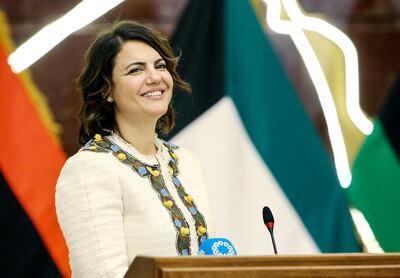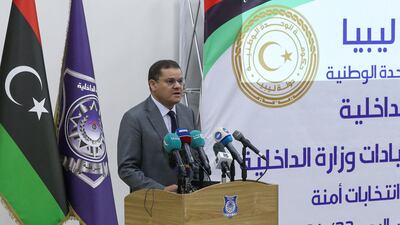Libya’s Prime Minister Abdul Hamid Dbeibah will put himself forward for the country’s December elections despite an earlier promise not to stand, senior government officials said on Sunday.
The country’s Higher National Elections Commission said at the weekend that registration for the December 24 presidential and parliamentary polls would open on Monday.

Mounting political tension has strained Libya’s fragile transition process, with wrangling over the legal basis for the vote, which was agreed in a UN-backed road map to end a conflict between parallel administrations in the country’s east and west.
The fighting halted with the formation of the UN-mediated interim government led by Mr Dbeibah to reunify institutions and plan the end-of-year vote. He and others in the government swore not to run, but his about-turn was long predicted by analysts.
Deep divisions between competing sides threaten both the December 24 vote and the wider peace process, seen as the country’s best hope in years of ending the instability and violence that has plagued Libya since dictator Muammar Qaddafi was overthrown in 2011.
An election law proposed by the parliament in September was rejected by the body's critics, including other political entities, for breaching some conditions set by the UN road map.
The law set a first round of the presidential election in December but said the date for parliamentary elections would not be set until January.
The election commission chairman Emad Al Sayeh, who has previously said parliamentary elections would take place within 30 days of the presidential election, said it had received amendments to the law from the parliament.
Registration for presidential election candidates would be open until November 22 and for parliamentary candidates until December 7, he said.
Other potential candidates include Khalifa Haftar, the commander of eastern-based forces in the civil war; Saif Al Islam Qaddafi, the son of the former dictator; the parliament head Aguila Saleh; and a former interior minister, Fathi Bashagha.
The vote law to govern the elections and other procedural matters have yet to be agreed.
There is still sporadic fighting between armed groups, and deep mistrust between the eastern and western factions. Thousands of foreign fighters are still on the ground, despite numerous calls from international officials for them to leave.
Days before diplomats meet in Paris for an international conference later this week to support the transition, Libya’s ruling presidential council on Saturday suspended Foreign Minister Najla Mangoush and barred her from travelling abroad. It said it was investigating what it described as the monopolisation of the country’s foreign policy without co-ordination with the government.

A spokeswoman for the council did not elaborate on the circumstances behind the decision.
The government challenged the council, a three-member body led by former diplomat Mohamed Al Menfi that serves as Libya’s president.
It said the council had “no legal right” and vowed that Ms Mangoush would perform her duties as normal. The unity government said the powers to “appoint or cancel the appointment of members of the executive authority, suspend them or investigate them” were exclusive to Mr Dbeibah.

